- Home
- Kevin Ashman
Medieval IV - Ring of Steel Page 7
Medieval IV - Ring of Steel Read online
Page 7
‘Consider it done,’ came the reply.
‘Let fortune be your comrade, Robert,’ added Madog, ‘and soon we will celebrate our victory with the best wine from the castle’s cellars.’
‘So be it,’ said Robert and returned to his men.
----
Twenty leagues away, Madog led his column through north Wales toward Dolwyddelan. He had received reports from Meirion that the castle was in his control and had been taken without bloodshed. His army had pulled back amongst the trees to rest and though they were almost five thousand strong, the bulk of the men were out of sight amongst the undergrowth.
Madog sat against the trunk of a large tree and leaned his head back, glad of the break. His page came over and undid a leather wrap containing cold but soft strips of pork. Madog looked at the boy and smiled.
‘Peter,’ he said, ‘are these for me?’
‘Yes, Sire’, said the boy. ‘I was given them by one of the soldiers at Howarden before we left. He stole them from the castle’s kitchens but I have eaten enough and would share them with you.’
‘That’s very kind of you, Peter,’ said Madog, ‘but I will not eat the meat of comfort when my men eat meat of campaign. Together we will share some salted mutton and you can tell me of your grandfather. I hear he was a respected knight?’
‘He was, Sire but fell at Acre.’
‘A sad tale,’ said Madog, ‘but all knights would rather die on campaign than rot at a fireside as their bodies grow old. Go, share the meat with your comrades, your selflessness has been noted.’
‘Sire,’ came a shout and Madog leapt to his feet as three horses galloped up the forest path. The first rider he recognised but the other two were unknown to him.
He grabbed the reins of the first horse as Emrys reined him in.
‘Sire,’ he said. ‘I bear grave news, these two men are scouts of Cynan and followed an English column north. The column is led by the castellan of Denbigh Castle and his absence left the fortress ripe for an assault from Cynan’s army.’
‘A fortuitous situation,’ replied Madog, ‘what causes you so much angst?’
‘Sire,’ said one of the men, ‘this very morn we saw a horseman ride to join De-Lacey’s column. We believe he was an informer for within the hour, the column turned and is riding back to Denbigh as we speak. We ride to warn him but they are not far behind and we fear our comrades will be unprepared. They could be slaughtered.’
‘How far behind you are they?’ asked Madog
‘About an hour,’ said the rider. ‘They follow the river path in the next valley. At the pace they ride they will be back in Denbigh by dawn.’
‘Tell me,’ he said, ‘you know these lands, is there a place where we could engage them?’
The two men looked at each other before the first turned back to face Madog.
‘I suppose you could use the farm of Tristan,’ he said, ‘it is an open plain flanked by wooded hills but it is narrow at one end and would be difficult to retreat from should the need arise.’
‘That sounds perfect,’ said Madog, ‘I have no intention of retreating. Emrys, call the men to arms and follow these two to the place they described. Set our archers amongst the treeline and block off the narrow end of the valley like a stopper in a flask of wine. I will stay here with the horses and attack them from the rear.’
‘Aye, Sire’, replied Emrys and span his horse around.
‘To arms,’ he called as he galloped down the path, ‘every man on his feet and prepare to march. Pass the word, leave all your possessions here, just carry your weapons and water. Quick about it, for there are Welshmen about to be slaughtered and we will not let that happen.’
----
Henry De-Lacey rode at the head of his column. Though the pace was slow, they were going as fast as they could without leaving the infantry far behind. Despite his frustration, he would need every man he could muster if he was to deny the rebels the castle but as the night approached, he knew they would soon have to make camp.
‘Captain,’ he called, ‘continue the march beyond that far hill and then go firm. Tell the men to be on their guard for these hills are riddled with Welshmen.
‘Aye, Sire’, said the officer and rode back to relay the message to his sergeants. De-Lacey, lifted his flask and drank deep of the watered wine but was only half done when he slowly lowered his flask and stared at the sight unfolding before him.
----
At the end of the valley, a column of foot soldiers trotted across the narrow strip of land between two hills and formed up line-abreast, barring any further advance. To either side, heavily wooded slopes meant any route out of the valley would be difficult. De-Lacey looked around in concern for it was clear the ground had been carefully selected for that very reason. For several moments he just stared at the enemy forming up before him but his officers were more experienced and immediately started organising the men.
‘Drop your packs,’ shouted one of the officers, ‘and prepare weapons. Pike bearers to the fore, archers to the flanks.’
Another officer rode up and reined in his horse alongside De-Lacey,
‘Sire,’ he said, ‘what are your orders?’
De Lacey looked around him slowly, his mind cold and calculating yet angry that he had been so foolish.
‘My orders are simple,’ he said eventually, ‘these are my lands and have been for ten years. I am not about to step aside and let this rabble walk all over them as they please. Bring all the foot soldiers to the fore, Fenwick. Assemble them line-abreast and have them ready to advance, I will give the enemy one chance to concede the road but be prepared for the worst.’
‘Aye, Sire’, said the officer and watched as De-Lacey walked his horse forward to parley with the Welsh.
----
On the opposite end of the field, Emrys mounted his own horse and rode out to meet the oncoming Lord. Within moments they were less than ten paces apart and both men stared as they weighed up their opponent. De-Lacey wore sheet metal armour with a brightly decorated tabard over the top. His arms and legs were protected by the brightest of chain mail and a red cape fluttered in the wind behind him. The visor of his helm was open and in his hand he held a long lance, reaching upward toward the sky. His horse was draped in a heavy barding depicting the colours of his family crest.
Emrys looked him up and down before glancing down at his own attire of a chainmail shirt, leather leggings and dirty woollen cape.
‘Excuse me, Sir Knight,’ said Emrys, ‘if I had known this was to be a formal affair, then perhaps I would have dressed accordingly.’
De Lacey ignored the jibe and looked over Emrys’ shoulder toward the Welsh lines.
‘Where is your master?’ he demanded, ‘I would talk with someone of similar standing.’
‘Ah, that’s a problem,’ said Emrys, ‘for my master is otherwise engaged so I will have to do.’
De-Lacey turned his attention to the poorly dressed man before him.
‘You?’ he sneered, ‘surely you are no more than a serf?
‘As are all of my comrades,’ said Emrys, ‘and though they be poorly dressed, I can assure you they wear the armour of free men.’
‘Freemen they may be,’ said De-Lacey, ‘yet all men are governed by the dictates of those they call master. Even I answer to the king so what makes you think you are any different?’
‘We are happy to answer to our betters,’ said Emrys, ‘as long as they be Welsh. Now, enough idle chatter and say what it is you have to say, Sir Knight so we can all be back about our business.’
‘You know what I want, knave, you trespass upon my lands and block the road south. I have urgent business to attend and demand you clear the path.’
‘I cannot do that, Sir Knight for though these lands may belong to the crown, we differ about whose head that crown should sit upon. I am no traveller, Sire but would wager Lincoln is a fair distance from here. Why don’t you go home to your ancestral lands and leave us to ours
?’’
‘These are not your lands,’ growled De-Lacey, ‘they belong to me, granted by the hand of Longshanks himself.’
‘Longshanks gifted that which he did not own after he killed Llewellyn.’ said Emrys, ‘and we do not recognise the legitimacy of your claim.’
‘I warn you for the last time, Welshman,’ said De-Lacey, ‘clear the path or suffer the consequences.’
‘The path is ours, Sire and we will remain upon it.’
‘So be it, peasant,’ said De-Lacey, ‘warn your army of farmers that English steel will soon be amongst them.’
‘We look forward to it,’ said Emrys and both men turned to return to their respective lines.
----
‘How says their commander?’ asked Fenwick upon De-Lacey’s return
‘The man was nought but a peasant,’ said De-Lacey, ‘and my air was poisoned with his presence. Prepare the men for battle, Fenwick and on my command we will move forward to engage these upstarts. Let them see they are nothing but a fly to be swatted aside.’
‘Sire, you do know the ground is not favourable?’
‘The ground is irrelevant,’ said De-Lacey, ‘we outnumber them two to one and though they hold the territorial advantage, if we can engage them at close quarters there can be only one outcome.’
‘If you say so, Sire.’
‘I do, Fenwick, give the command. Line abreast, advance to engage.’
----
The Welsh lines watched the oncoming English, each man growing nervous as they realised they were vastly outnumbered. Slowly the gap between them closed until the enemy were no more than fifty paces distant. Suddenly the advancing lines stopped and De-Lacey stepped forward.
‘One last chance, Welshmen,’ he shouted, ‘yield the road or death will be the order of the day.’
‘Go to hell, Englishmen,’ answered Emrys and turned his head so his own lines could hear him better. ‘Men of Wales,’ he roared, ‘present pikes.’
The front rank dug the hafts of their weapons into the ground and leaned them forward, a solid defence against any horse charge. The next rank placed their weapons over the shoulders of those before them, the whole thing presenting a wall of Welsh steel.
‘Spearmen prepare,’ roared Emrys and the rear ranks hefted their spears ready to throw. Each man had another three laying on the floor at his side.
Across the open ground, De-Lacey was also shouting at his men.
‘Archers,’ he roared, ‘target the centre, release!’
Hundreds of arrows filled the air but Emrys had expected the tactic and within seconds had called out the counter command.
‘Enemy arrows, present shields.’
Every man in the Welsh lines crouched low and lifted their shields against the hail of incoming death. Arrow points thudded into the laminated wooden boards and though some found their targets, most stuck in the shields with no more than an arrowhead protruding on the inside.
Over and over again the air filled with arrows and slowly the Welsh lines collapsed in a heap, their shield walls bristling with the shafts of thousands of arrows.
De-Lacey held up his hand and the arrow storm died away. For several moments there was silence as he stared at the decimated lines of the enemy strewn upon the field.
‘Their bravado has been silenced by English steel,’ he shouted, ‘though beware the ones who feign death. Upon my command, advance to contact and should any regain their feet, plough straight through them for they are nought but peasants with ideas above their station. Ready. Advaaance.’
----
‘Wait,’ warned Emrys from beneath his shield, ‘wait…ready…now.
As one the Welsh army rose from the floor and regained the defensive positions they had held moments before. Emrys looked around, grateful to see that the number of casualties incurred were mercifully low.
----
‘Sire, we should hold back the men,’ shouted Fenwick in the English ranks, ‘and use the bow men until the enemy numbers are weakened further.’
‘No,’ shouted De-Lacey, ‘we waste too much time, our men will take advantage while there is confusion amongst their ranks.’ He drew his sword and held it high, ‘onward men,’ he roared, ‘cut them down as the filth they really are,’ and slowly the lines of infantry started the advance.
----
‘Spears,’ roared Emrys from the defending lines and instantly the air was full as the missiles flew to land amongst the attackers. Many were deflected by shields and though some men fell, the impetus of the attack was not affected. The English army started to run, keeping close together for maximum effect. By the time the two sides met moments later they were running at full pelt, each screaming their own battle cries as they smashed against the Welsh lines.
----
Though the attackers tried desperately to avoid the wall of metal spear points, many were impaled as the two armies met in a crash of metal, blood and screams of agony. The impact and of the numerically superior English meant the Welsh lines were forced back several paces before they managed to regain a foot hold.
‘Hold the line,’ roared Emrys, knowing full well that a broken line meant almost certain defeat. He added his weight to the back of the defenders, pushing forward as hard as he could. In the front ranks, men were crushed without any possibility of wielding their weapons but those behind swung over their comrades’ heads to strike at any enemy within reach. Blood and bone flew everywhere as skulls were dealt crushing blows and wherever an opportunity presented itself, blades were thrust through gaps to find flesh on the opposite side.
The sounds of battle echoed around the field as men fought desperately, their battle cries only bested by the screams of the freshly wounded. Some men already dead stayed upright in the crush, the pressure unrelenting as both forces pushed forward and those in the first few ranks were soaked in the blood of friend and foe alike.
‘Hold the line,’ screamed Emrys again as his ranks took another few steps back, ‘trumpeter, give the signal.’
The sound of a horn rang through the air and the pressure eased momentarily as the English looked around them in confusion. For a few seconds there was nothing to see but the sound of rushing air made Fenwick look up to see the sky darkened by more arrows, though this time of Welsh origin.
‘Enemy archers,’ he cried, ‘present shields, but it was too late, the volleys of steel tipped ash thudded into the backs of the English before they had time to disengage and hundreds of men fell within minutes.’
‘Disengage,’ roared Fenwick, ‘retreat to the slopes.’
‘Cancel that command,’ roared De-Lacey, ‘press on with the assault.’
‘Sire,’ shouted Fenwick, ‘the men are being slaughtered. They will all be dead unless we do something immediately.’
De Lacey, hesitated and looked around but before he could answer another shout came from one of his men.
‘Riders to the north, we are surrounded.’
He looked back up the valley and sure enough, dozens of cavalry were cresting the ridge, closing off their one avenue of escape.
‘Sire, we need to do something,’ shouted Fenwick.
De Lacey snapped out of his stupor and made a decision.
‘Fenwick, engage the archers on the left flank only. Return their attack with willow of our own.’
‘Sire, they are hidden amongst the trees, the volleys will be in vain.’
‘I will lead a charge through their lines,’ said De-Lacey, ‘and secure a route out of here for our men. All I need you to do is distract them for a few moments to aid our passage. As soon as we reach the treeline, withdraw the infantry but change the aim of our own archers onto the Welsh to prevent pursuit. We have moments only, Fenwick so make it happen. Once we are amongst the trees we can take on the archers hand to hand and lose ourselves amongst the forest.’
‘Aye Sire’, shouted Fenwick and turned his horse.
In the distance he could see the Welsh horsemen had formed up into
a straight line and begun their advance down the valley.
‘Archers,’ he called, ‘new target, left flank. Volley fire at the front edge of the forest, loose arrows.’
The English archers changed the point of aim and sent volley after volley into the trees. Underneath the cover of flying willow, De-Lacey led his cavalry charging toward the enemy’s hidden position, losing only a few riders on the way. As soon as they entered the wood, Fenwick organised the retreat and within minutes his infantry were racing toward the safety of the dense forest.
----
‘They are escaping,’ roared Madog from the centre of the Welsh cavalry line, ‘increase the pace, advance.’
The horsemen urged their mounts into the gallop and the line broke up as each sought their own route over the rough ground. Soon the valley was covered with charging cavalry and though most of the enemy reached the treeline, the Welsh horsemen set about the slow and the wounded, cutting them down without mercy.
Madog rode to meet Emrys who was organising aid for his wounded amongst the Welsh infantry lines.
‘How goes it, Emrys?’ he asked.
‘A few dozen killed, Sire and twice that wounded. Your arrival came none too soon.’
‘The marshes at the top of the valley hindered our progress,’ said Madog, ‘and I am pained to see so many of our men hurt.’
‘It matters not, Sire, the aim was to prevent Lincoln’s column from falling on the rear of Cynan’s army unawares and despite our losses, I think we have succeeded.’
‘Indeed we have,’ said Madog, ‘though I don’t think De-Lacey’s army are entirely routed. No doubt he will reform and make another attempt.’
‘Are you going to pursue him through the woods?’
‘No, it invites ambush upon our men. Let him go, at least we have bought some time. I will take the cavalry to Denbigh with all haste and warn Cynan of the risk.’
‘What about us, Sire?’
‘Bury our dead and patch up the wounded. There is a village an hour’s march from here. Go firm there and await my return. Unless our strength is needed in the assault we will be back by sundown tomorrow.’

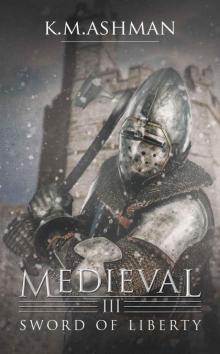 Medieval III - Sword of Liberty
Medieval III - Sword of Liberty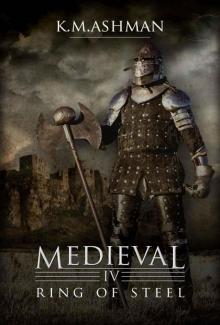 Medieval IV - Ring of Steel
Medieval IV - Ring of Steel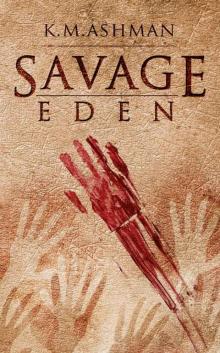 Savage Eden
Savage Eden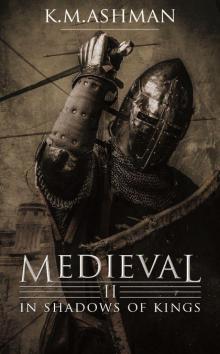 Medieval II - In Shadows of Kings
Medieval II - In Shadows of Kings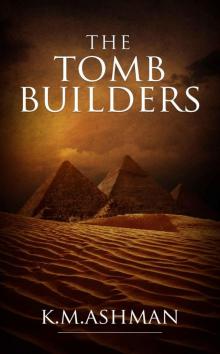 The Tomb Builders
The Tomb Builders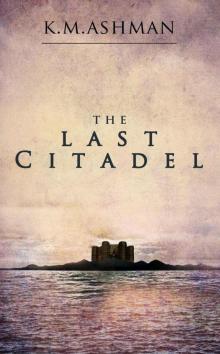 The Last Citadel
The Last Citadel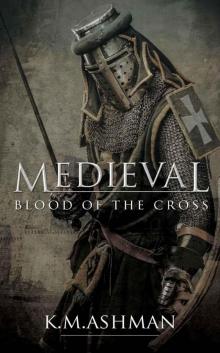 Medieval - Blood of the Cross
Medieval - Blood of the Cross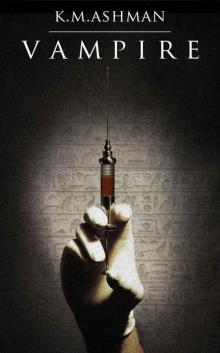 Vampire
Vampire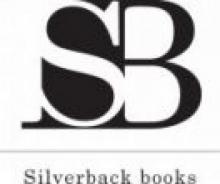 Roman
Roman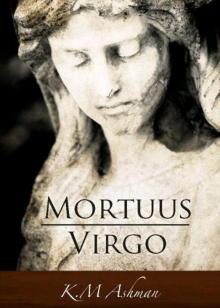 Mortuus Virgo
Mortuus Virgo